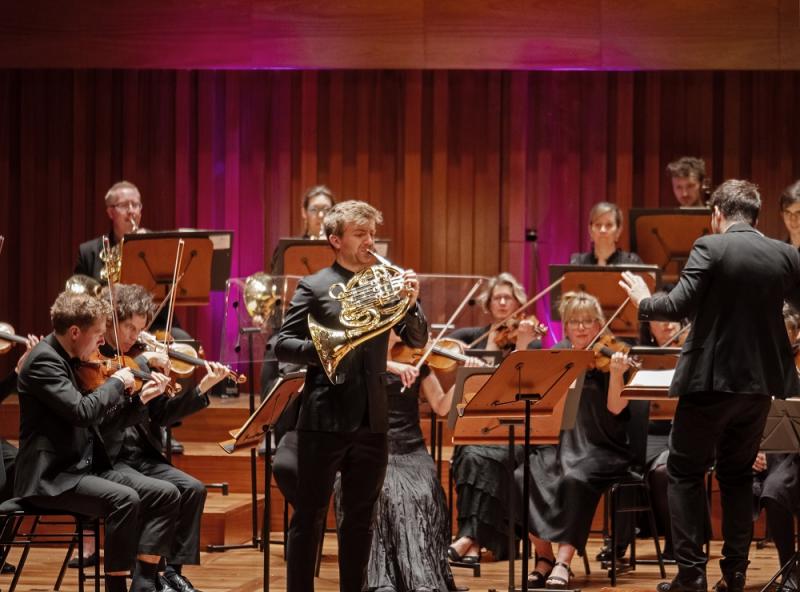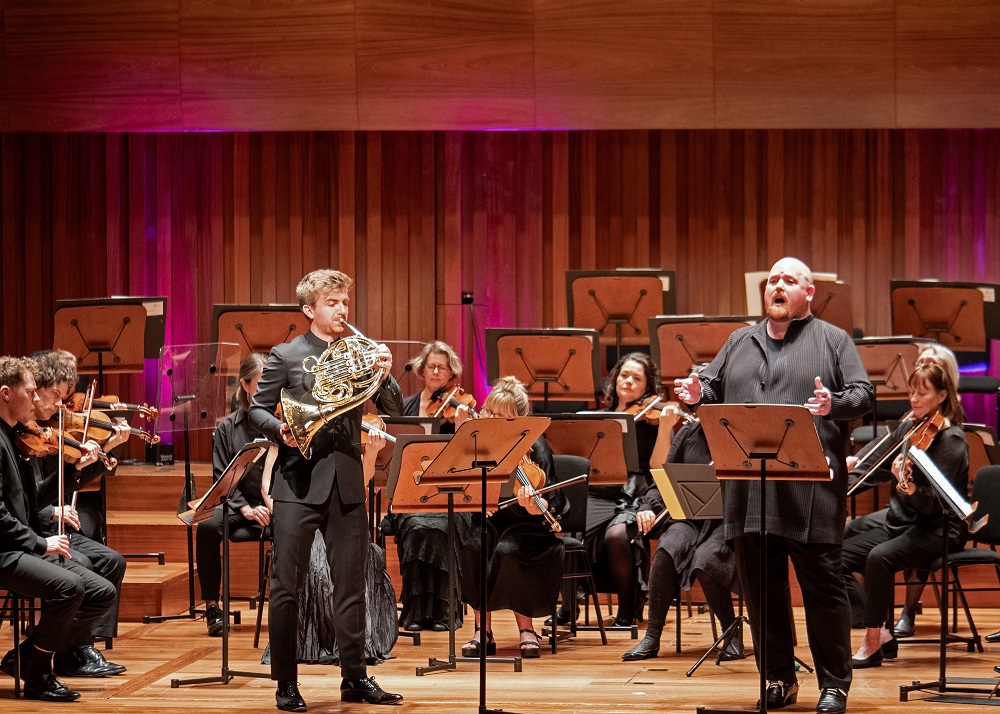Goldscheider, Spence, Britten Sinfonia, Milton Court review - heroic evening songs and a jolly horn ramble | reviews, news & interviews
Goldscheider, Spence, Britten Sinfonia, Milton Court review - heroic evening songs and a jolly horn ramble
Goldscheider, Spence, Britten Sinfonia, Milton Court review - heroic evening songs and a jolly horn ramble
Direct, cheerful new concerto by Huw Watkins, but the programme didn’t quite cohere

Milton Court, like its parent Barbican Hall, disconcertingly inflates the sound of larger ensembles and voices. Had there been a conductor for all four pieces in the Britten Sinfonia’s programme - Michael Papadopoulos was there for the two most recent works – the approach might have been more nimble and nuanced. Though Mozart in masterpiece form could have been a gambit to entice warier punters, a fourth British work would have rounded out the overall picture better.
That all sounds grudging, especially as the senselessly ACE-defunded Britten Sinfonia needs all the help it can get right now, and so much was right, or nearly right. Hearing Nicky Spence with Ben Goldscheider in Britten's ever-astounding Serenade (pictured below) was fascinating. Spence's lyric-heroic tenor is well on the road to Tristan now, which meant the pretty runs of Ben Jonson's hymn to the moon as set in Mozart horn-concerto pastiche style somewhat floored him, and the true inscaping of the evening-to-night trajectory now belongs definitively to Allan Clayton. Interestingly, Ben Goldscheider gave the heroic cue with the unaccompanied horn summons, beginning forte rather than piano - a golden, rounded sound, of course, but not exactly the preface to the dying of the light.
Where forthrightness was called for - and it is, frequently - Spence's tone, too, was peerlessly full-throttle, and he is a master of characterisation, so each setting of great poetry had its special atmosphere. We even got a Scottish tinge for the "purple glens" of Tennyson's "Nocturne" as well, of course, as the mounting terrors of "This ae nighte". No chance of concentration lapsing with two such artists. Even so, I can't help feeling that Papadopoulos might have been called in for a bit more orchestral fine-tuning.  Judith Weir's Heroic Strokes of the Bow sounded the metal of the Britten Sinfonia strings. Those treacherous pregnant silences caught just a few string hairs out of place, though. And though there are two strong ideas here, the repetitiousness didn't seem entirely felicitous, evoking a rusty old engine running out of steam (it turns out the title is also that of a Paul Klee painting with violin bows and pegs against a blue background, so the deconstruction was not inappropriate).
Judith Weir's Heroic Strokes of the Bow sounded the metal of the Britten Sinfonia strings. Those treacherous pregnant silences caught just a few string hairs out of place, though. And though there are two strong ideas here, the repetitiousness didn't seem entirely felicitous, evoking a rusty old engine running out of steam (it turns out the title is also that of a Paul Klee painting with violin bows and pegs against a blue background, so the deconstruction was not inappropriate).
Huw Watkins' new concerto for Goldscheider is gratefully written for the horn and its outer movements feature healthy interplay wth the orchestral brass. The central movement also spotlights the Britten Sinfonia's great oboist Nicholas Daniel. Yet despite a few piquant twists for woodwind, it all feels a bit too comfortable - audience-friendly is no bad thing, but a bit more grit in the oyster, such as resonates in so many of Watkins' marvellous chamber works, wouldn't have gone amiss.
Weir and Watkins seemed to refract two aspects - the later stop-start style in the former, the rhythmic ebullience of earlier works in the latter - of a master who might have featured in the programme, Michael Tippett; curiously, his superb Second Symphony was being conducted over at the Royal Festival Hall last night, too. To end with Mozart certainly sent everyone out with a smile, but felt not quite right, especially as leader Max Baillie's lively direction wasn't quite enough; apart from the inner string parts in the Andante's econd theme, intensified on the repeat, a true conductor's nuances could have enriched the experience. Lively, certainly, with the upper strings standing; but again, that Milton Court environment made it sound almost bullish.
rating
Explore topics
Share this article
The future of Arts Journalism
You can stop theartsdesk.com closing!
We urgently need financing to survive. Our fundraising drive has thus far raised £49,000 but we need to reach £100,000 or we will be forced to close. Please contribute here: https://gofund.me/c3f6033d
And if you can forward this information to anyone who might assist, we’d be grateful.

Subscribe to theartsdesk.com
Thank you for continuing to read our work on theartsdesk.com. For unlimited access to every article in its entirety, including our archive of more than 15,000 pieces, we're asking for £5 per month or £40 per year. We feel it's a very good deal, and hope you do too.
To take a subscription now simply click here.
And if you're looking for that extra gift for a friend or family member, why not treat them to a theartsdesk.com gift subscription?
more Classical music
 Hallé John Adams festival, Bridgewater Hall / RNCM, Manchester review - standing ovations for today's music
From 1980 to 2025 with the West Coast’s pied piper and his eager following
Hallé John Adams festival, Bridgewater Hall / RNCM, Manchester review - standing ovations for today's music
From 1980 to 2025 with the West Coast’s pied piper and his eager following
 Kaploukhii, Greenwich Chamber Orchestra, Cutts, St James's Piccadilly review - promising young pianist
A robust and assertive Beethoven concerto suggests a player to follow
Kaploukhii, Greenwich Chamber Orchestra, Cutts, St James's Piccadilly review - promising young pianist
A robust and assertive Beethoven concerto suggests a player to follow
 Robin Holloway: Music's Odyssey review - lessons in composition
Broad and idiosyncratic survey of classical music is insightful but slightly indigestible
Robin Holloway: Music's Odyssey review - lessons in composition
Broad and idiosyncratic survey of classical music is insightful but slightly indigestible
 Classical CDs: Wolf-pelts, clowns and social realism
British ballet scores, 19th century cello works and contemporary piano etudes
Classical CDs: Wolf-pelts, clowns and social realism
British ballet scores, 19th century cello works and contemporary piano etudes
 Bizet in 150th anniversary year: rich and rare French offerings from Palazzetto Bru Zane
Specialists in French romantic music unveil a treasure trove both live and on disc
Bizet in 150th anniversary year: rich and rare French offerings from Palazzetto Bru Zane
Specialists in French romantic music unveil a treasure trove both live and on disc
 Scottish Chamber Orchestra, Ibragimova, Queen’s Hall, Edinburgh review - rarities, novelties and drumrolls
A pity the SCO didn't pick a better showcase for a shining guest artist
Scottish Chamber Orchestra, Ibragimova, Queen’s Hall, Edinburgh review - rarities, novelties and drumrolls
A pity the SCO didn't pick a better showcase for a shining guest artist
 Kilsby, Parkes, Sinfonia of London, Wilson, Barbican review - string things zing and sing in expert hands
British masterpieces for strings plus other-worldly tenor and horn - and a muscular rarity
Kilsby, Parkes, Sinfonia of London, Wilson, Barbican review - string things zing and sing in expert hands
British masterpieces for strings plus other-worldly tenor and horn - and a muscular rarity
 From Historical to Hip-Hop, Classically Black Music Festival, Kings Place review - a cluster of impressive stars for the future
From quasi-Mozartian elegance to the gritty humour of a kitchen inspection
From Historical to Hip-Hop, Classically Black Music Festival, Kings Place review - a cluster of impressive stars for the future
From quasi-Mozartian elegance to the gritty humour of a kitchen inspection
 Shibe, LSO, Adès, Barbican review - gaudy and glorious new music alongside serene Sibelius
Adès’s passion makes persuasive case for the music he loves, both new and old
Shibe, LSO, Adès, Barbican review - gaudy and glorious new music alongside serene Sibelius
Adès’s passion makes persuasive case for the music he loves, both new and old
 Anja Mittermüller, Richard Fu, Wigmore Hall review - a glorious hall debut
The Austrian mezzo shines - at the age of 22
Anja Mittermüller, Richard Fu, Wigmore Hall review - a glorious hall debut
The Austrian mezzo shines - at the age of 22
 First Person: clarinettist Oliver Pashley on the new horizons of The Hermes Experiment's latest album
Compositions by members of this unusual quartet feature for the first time
First Person: clarinettist Oliver Pashley on the new horizons of The Hermes Experiment's latest album
Compositions by members of this unusual quartet feature for the first time

Add comment